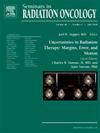磁共振成像引导的自适应放射治疗
IF 3.2
3区 医学
Q3 ONCOLOGY
引用次数: 0
摘要
磁共振成像引导放疗(MRIgRT)与基于计算机断层扫描(CT)的图像引导放疗相比,提高了软组织对比度。对靶区和周围放射敏感结构的良好可视化有可能改善肿瘤治疗效果,部分原因在于更安全的剂量递增和自适应计划。在这篇综述中,我们将重点介绍自适应 MRIgRT 计划的工作流程,其中包括模拟成像、日常 MRI、确定等中心偏移、轮廓、计划优化、质量控制和交付。提高 MRIgRT 的利用率将取决于解决该技术的技术局限性,同时解决治疗效果、成本效益和工作流程培训等问题。本文章由计算机程序翻译,如有差异,请以英文原文为准。
MRI-Guided Adaptive Radiation Therapy
Magnetic resonance imaging-guided radiation therapy (MRIgRT) has improved soft tissue contrast over computed tomography (CT) based image-guided RT. Superior visualization of the target and surrounding radiosensitive structures has the potential to improve oncological outcomes partly due to safer dose-escalation and adaptive planning. In this review, we highlight the workflow of adaptive MRIgRT planning, which includes simulation imaging, daily MRI, identifying isocenter shifts, contouring, plan optimization, quality control, and delivery. Increased utilization of MRIgRT will depend on addressing technical limitations of this technology, while addressing treatment efficacy, cost-effectiveness, and workflow training.
求助全文
通过发布文献求助,成功后即可免费获取论文全文。
去求助
来源期刊
CiteScore
5.80
自引率
0.00%
发文量
48
审稿时长
>12 weeks
期刊介绍:
Each issue of Seminars in Radiation Oncology is compiled by a guest editor to address a specific topic in the specialty, presenting definitive information on areas of rapid change and development. A significant number of articles report new scientific information. Topics covered include tumor biology, diagnosis, medical and surgical management of the patient, and new technologies.

 求助内容:
求助内容: 应助结果提醒方式:
应助结果提醒方式:


